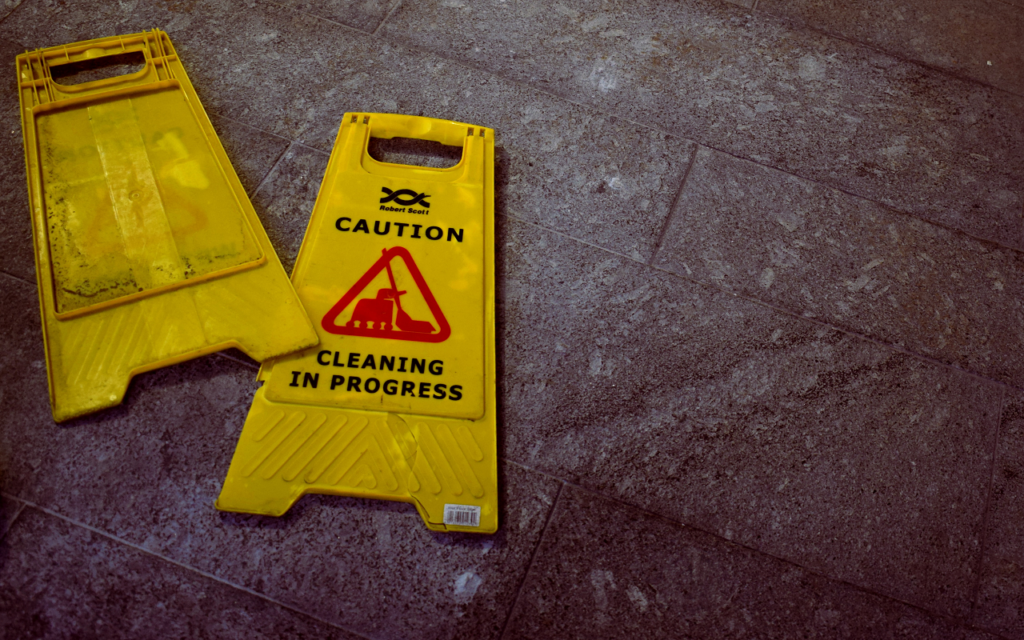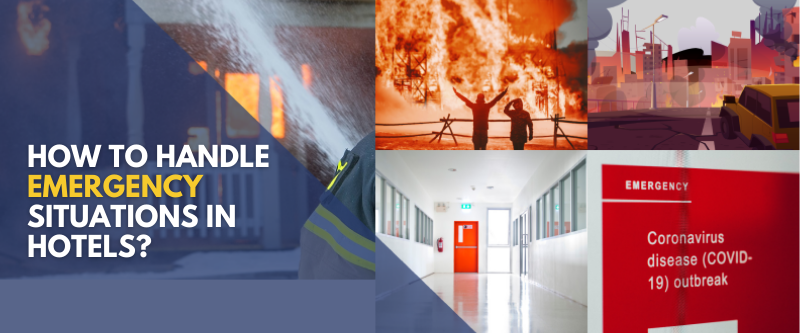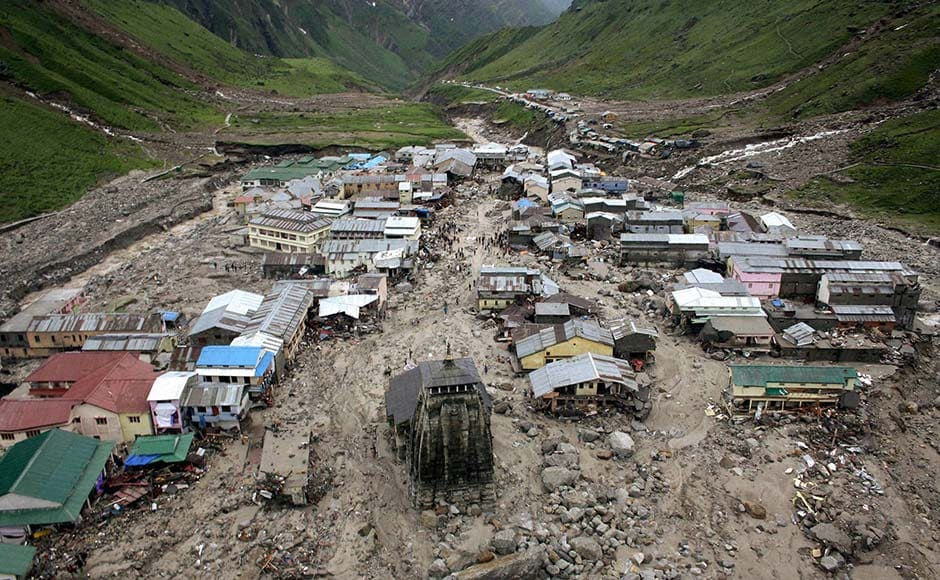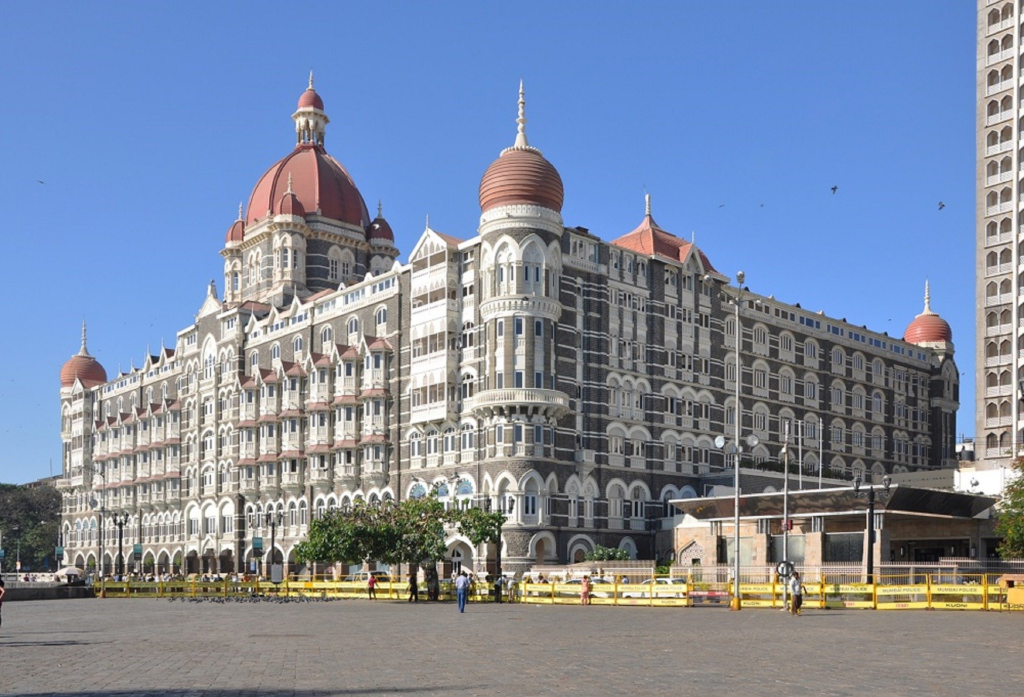The ongoing outbreak of covid-19 left an adverse impact on the world and also on the hospitality industry. It definitely taught us that emergencies come unexpectedly and we have to be prepared for them.
There are some situations we can never be prepared for.
In this blog, I am going to address different types of emergency situations in hotels and how you can cope up with them.
Table of Content
- How to handle emergency situations in hotels?
- Health issues
- Natural calamities
- Personal accidents
- Fire
- Death
- Covid-19
- Employee strikes
- Terrorist or other criminal activities
- How can you prevent such crises at your hotel?
- Prepare an action plan ready for emergencies
- Form an emergency specialist team
- Connect with doctors in locality
- Opt for safety audits regularly
- Maintain guests records
- Always keep a first aid kit in every department
- Stay in touch with police or local authorities
- Install and upgrade fire safety equipments
How to Handle Emergency Situations in Hotels?
Hotel emergencies are either the result of ignorance (from staff and guests), or at times nature’s act.
Let’s take a look at some of the common emergency situations in hotels and action plans to handle them.
1. Health Issues
Headache, food poisoning, and viral fever, are amongst common health problems guests face. And often, they connect with the front desk for medical help.
However, at times health issues could be fatal and need immediate attention and treatment.
How to handle them?
The first and foremost step would be determining if the situation can be handled using a first aid kit. If not, connect with the nearest doctor in the vicinity immediately.
If it’s a serious problem, guests need to be shifted to a hospital. For such cases, keep contact information of medical helplines handy. Don’t forget to have a wheelchair available on every floor.
Train staff to perform CPR (Cardiopulmonary Resuscitation) for heart attacks. This can definitely save someone’s life.
If you need to know the contents of first aid kits, here’s an article for your reference:
First aid kit checklist for hotels
2. Natural Calamities
In 2013, disastrous floods occurred in the Northern part of India, which resulted in a huge loss of lives, properties, and the environment.
Tourist destinations were majorly impacted owing to this; which eventually took 5-6 years to get re-established.
It’s not only floods, but other natural calamities such as earthquake, tsunami, volcano eruptions, and cyclones, that can cause critical damage to mankind, and hence the hospitality industry.
You can’t stop them, but you can take precautionary measures to handle such emergency situations in hotels.
How to handle them:
First of all, get structural safety certification for your property. You may be wondering what that is.
Well, it’s a certification provided after a thorough inspection of your property, whether it’s safe to withstand any natural disaster. The concept is new, and currently adopted by Indian government to minimise casualties and critical infrastructure damages.
Secondly, get your property covered under insurance. As per a report published by Swiss Re Group,
In 2019 only 3.3% of the global properties were written premium checks for damages caused due natural disasters (act of God).
Most of the hotel owners fail to get insurance for their property. If you don’t have one, get your property insured now.
Keep emergency action guidelines in every room and POS outlets.
3. Personal accidents
Accidents happen because of minor faults that we tend to neglect. For instance, an electrical socket left unrepaired can be a reason for a major mishap.
Let me share my experience with you. When I was in college, I was doing an internship in the F&B department.
One fine evening, we had an award function organised at the property. When the event ended, the housekeeping staff started cleaning the area. But, they forgot to put a wet floor sign over there.

As I was about to exit from the banquet hall, I suddenly slipped and fell down. The impact of the fall was entirely on my hand, and that cost me a broken arm, dislocated wrist, plus a month’s leave from college.
Since the accident happened on the premises, the hotel had to bear all the medical expenses (₹75,000).
So, if you want to avoid such loss, it’s important to prevent accidents at your property.
How to handle them?
Just by investing in some simple measures, you can avoid a huge accident. I would recommend following the UNAGI approach (you would relate if you are a F.R.I.E.N.D.S fan).

It’s easy – ‘Stay cautious and keep everything perfect’. What I mean is, focus on small things such as:
- Repairing faulty electrical sockets;
- Placing ‘caution-wet area’ signs (so no one would face a situation like I did);
- Check for spillages that make the floor slippery;
- Appropriate lighting in every nook and corner of hotel;
- Report any gas leakage or live wires;
- Ensure the parapets are of appropriate lengths; and so on.
4. Fire
Fire outbreaks are common among hotels. A couple of days back, ‘Passion fruit hotel’, a luxurious property in Taiwan, was in the news for a fire accident.
As per the news published by Focus Taiwan (CNA),
The incident left 20 people injured. The cause of the fire was reported to be old carpets on the unused floors. The initial investigation revealed that a short circuit might have ignited the fire.
It can be said that fire accidents do cause a terrible loss of life and property.
How to handle them?
Handling fire outbreaks might seem as easy as they show in movies, but it’s not. Especially for hotels, since they have a minimum of 25 to 30 people including present at any given time at the property
But as we are taught since childhood, in case of fire, remember -“keep calm, don’t panic”. Trust me, it works.
Now, what to do when there is a fire emergency situation in the hotel? First of all follow rule no. 1 (just joking. No seriously, follow it).
Call the fire brigade to come to your rescue. Meanwhile, use the fire extinguishers to contain the fire. If your property has fire sprinklers this task becomes easier.
Alert every guest and ask them to proceed towards the fire exit. Ensure the staircase has radium strips along the path to help guests find their way outside.
5. Death
Death is inevitable. But if such an incident happens on hotel premises, it can be quite troublesome.
There can be various reasons for death like heart attack, brain hemorrhage, asphyxia, allergy, or electrical shock. I know it’s impossible to rule out all possibilities and devise an action plan for each one.
However, you can instigate measures for handling such emergency situations at your hotel.
How to handle them?
The main problem lies in controlling the chaos created on the site. Such incidents leave guests in shock, and some may even opt for early checkouts demanding refund.
During such situations, first of all get a doctor who can certify the death and cite the reason behind it. Next, connect with your local police officers and explain to them about the entire scenario.
As far as shifting the guests’ cadaver is a concern, try to do that from the exit to avoid seeking unnecessary attention from so called paparazzis.
Once you complete the formalities, get the room cleaned, sanitised, and leave it unoccupied for a couple of days.
6. Covid-19
I’m sure this one doesn’t need any special explanation. We all are aware of the current situation across the globe. What started a year back is now a part of our daily routine.
Covid-19 is indeed one of the emergencies which the world was not ready for (and still isn’t, considering the phases of virus found every other day).
The rise and fall of covid-19 positive patients, has made it tough for the hospitality and tourism industry to grow at a gradual speed.
Talking about the hotels, guests are usually sceptical about a hotel’s capability to handle covid situations.
How to handle them?
With the hotels reopening again, there are certain rules that need to be adhered to. However, there’s one question that is still persistent – what to do if a guest is covid positive?
As an immediate action plan, Initiate a lockdown protocol on the floor where the guest is staying, and allow only one specific personnel to service that room by wearing a PPE kit.
The particular area should be sealed for a period of 14 days. Arrange for a covid test for both guests and staff members.
Once everybody in the property tests negative, get the property sanitised completely. Don’t miss even a corner.
We have curated some blogs for hotels addressing on how to restart their business post covid-19 situation, do give them a read here:
COVID-19 Survival Kit For The Hotel Industry
7. Employee Strikes
Although employee strikes are uncommon, they do fall in the category of hotel emergencies. This kind of situation is not favourable for any industry as it results in direct revenue loss.
Services and facilities are one of the key components of the hospitality industry, and employee strikes create a barrier in providing them to guests.
Sometimes the common reason behind these strikes are low salary hikes, new policies that are not in the favour of staff, or any demand that is left unaddressed by the hotels.
Generally, these strikes are observed for a day or two, sometimes a week. A prolonged employee strike can result in a catastrophic situation.
How to handle them?
There is no specific way for dealing with employee strikes. In such scenarios, the best you can do is either take a legal action, or call in for a mutual agreement.
In case the strikes are initiated by labour union, you have no other option but to wait for it to cease.
8. Terrorist Attack or Other Criminal Activities
The terrorist attack of 26/11 in India shocked the world. The gruesome activity left a big impact on the hospitality industry and changed the dynamics of hotel security.
The way terrorists attacked two of the 5-star deluxe properties in Mumbai was a big blow to the hospitality industry. It left us with one question – are hotels safe from terrorism?
Post that incident, hotels around the world adopted various strategies and equipment to avoid such situations in the future.
How to handle them?
Bomb threats in hotels are an uncommon occurrence. However, if the property is the talk of the town, the possibilities change.
But not all threats are real. Either they are a part of pranks or made just to create an atmosphere of terror in society.
We do have technological benefits these days like truecaller (Caller ID notifier), IP address trackers, and GPS which can help in tracing the culprit.
Still, I would suggest you stay alert. If you receive such threats, check for the caller ID. Don’t forget to record such calls.
Share the details with police authorities, and let them take care of the rest. Alert guests only if the threat seems legit, this will help in avoiding unwanted tension mounting among guests.
Apart from that, theft in hotels is quite common. From toiletries and towels to electrical gadgets, hotels fall prey to embezzlers every now and then.
Such cases lead to a monetary loss as well as tarnish the reputation of hotels. In fact, to get rid of theft in hotels, I have written a dedicated blog.
Theft in Hotels: How to Avoid Them Once and For All?
You can take a cue from it and implement those steps to catch muggers trying to steal from your property.
How can you prevent such crises at your hotel?
Now that we are thoroughly familiar with different types of emergency situations in hotels, let’s look at the preventive measures.
1. Keep an action plan ready for emergencies
Devising an action plan for every emergency situation in a hotel might seem an arduous task, but you can learn from the steps I’ve mentioned above.
It’s better to keep a reference guide available in every department, especially the front desk. Ask your staff to memorize it and in case of an emergency take the action accordingly.
2. Form an emergency specialist team
Just like you have a special team for monitoring sustainable practices at your property, you can create one for handling emergency situations in hotels.
Pick a staff member from each department to form a rapid action team. Once it is done, create training programs for them to handle emergencies.
Post training, they can start guiding the other staff members on how to act in case of an emergency situation. Moreover, conducting mock drills for your employees would be quite beneficial.
3. Connect with doctors in the locality
As I mentioned in one of my previous blogs, a list of doctors in your locality is a mandate for every hotel. If the property is 3-star or above, a doctor on call is a MUST.
If there’s a medical emergency in a hotel, the first step would be connecting with a doctor. So, it’s important for you to have such details.
I would recommend having a tie-up with the nearby hospital. If the situation goes out of hand and you need to admit a guest or a staff member for treatment, this would come in handy.
4. Opt for safety audits regularly
Audits are mandatory to keep a check on the quality of services provided to the guests. But did you know, safety audits are also compulsory?
These kinds of audits involve a thorough inspection of the property’s equipment and measures deployed for guests’ safety and well being.
This includes firefighting equipment, emergency exit areas, staff training, action time, and other security aspects.

5. Maintain guests records
Maintaining guests’ data is a crucial step in every hotel. Say, one of your regular guests is allergic to a food ingredient, and has mentioned it in his special requests. Remember to record such details for future references.
Further, you can ask for the medical history of staff members and guests (for allergies and preferences). However, if they aren’t willing to share, comply with them.
6. Always keep a first aid kit in every department
Minor accidents like cuts, burns, and scalds are common in hotels.
For example, the F&B and kitchen departments are prone to accidents as there is frequent use of heating appliances and sharp objects. So, whenever there’s a mishap on the floor, they should get first aid.
Meaning, every department in a hotel should be equipped with every medical essential.
7. Stay in touch with police or local authorities
When I was an intern at another property in the front office department, every day a police officer used to visit us for collecting C-forms (applications for international guests).
The step was and till date stands as one of the vital aspects of front desk operations and is important from the security point of view.
For instance, if any guest is involved in any sort of mishap, the local authorities can connect with the hotel for inquiries. So, keep your data updated and have regular verifications.
8. Install and upgrade fire safety equipment
Fire safety is one of the most neglected points in any business. Hoteliers usually install fire safety equipment during the property’s opening, but never keep a check on their quality and upgrades.
Consider a situation where you have a fire hazard at your hotel, but you are unable to extinguish it. Why?
Because the safety equipment were outdated. And that’s another reason hotels are victims of fire accidents.
It’s vital to have regular checks on expiry date, upgrades, and working conditions of fire safety equipment.
Apart from that, check on fire exits as they need to be free of hurdles. What I mean is, they should be clean and free from objects that would block or slow down guests’ pace while exiting during any emergency situations in hotels.
Conclusion
Emergencies are unpredictable. With covid-19 in the picture, the world is shaken to the core. People wonder what would be the next thing; whether a zombie apocalypse, an asteroid falling from space, or an alien attack.
These might seem fictional, but you never know what lies ahead. As of now we should focus on the common emergencies in hotels.
I have listed various ways and action plans to prevent and deal with emergency situations in hotels. It’s time for you to pull up your socks, devise action plans, and be ready to face them.




